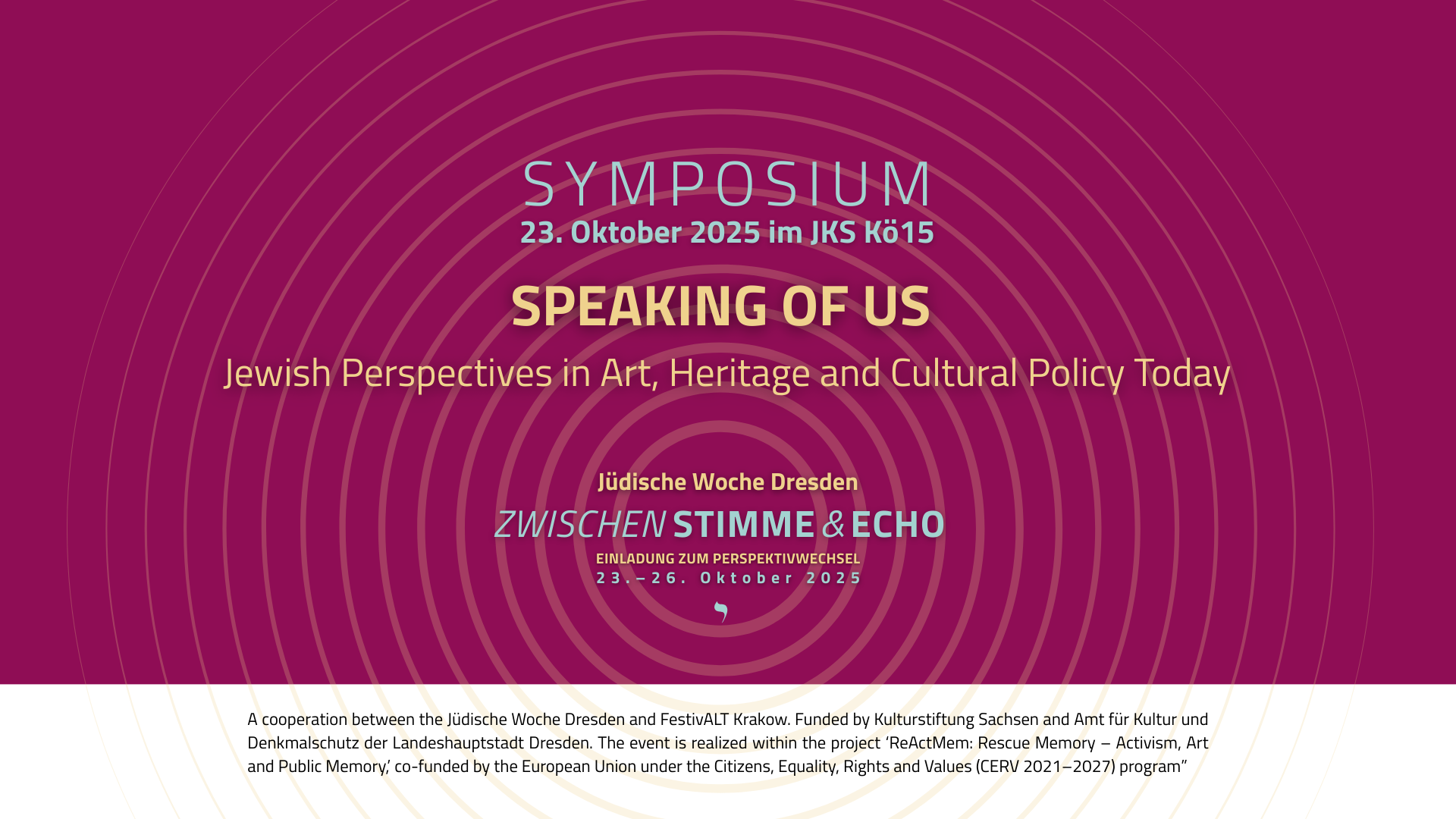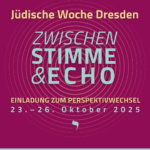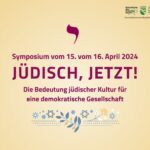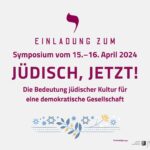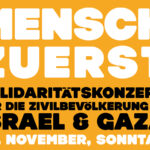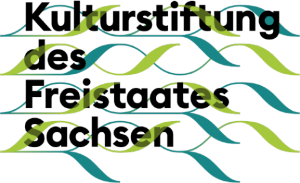Programm Symposium
2025
“Speaking of Us…” Jewish perspectives in Art, Heritage and Cultural Policy Today Symposium in Dresden
October 23, 2025 |9:30 a.m. – 4.30 p.m. | JKS Kö15, Königstr. 15, 01097 Dresden
Hauptlautsprache ist Englisch, alle Wortbeträge werden aber live Deutsch übertitelt. Direkte Übersetzungen aus dem Deutschen sind ebenfalls jederzeit möglich!
Send your registration to/Anmeldung an: orga@juedische-woche-dresden.de
SESSION 1
09:30 – 10:30 AM
“Speaking of Us…” – Who Tells Jewish Stories in Europe? (in German)
Conversation with Maja Gratzfeld (Visual artist and curator, Germany/Israel), Alex Stolze (Musician & Composer, Germany) and Valentina Marcenaro (artistic director Jüdische Woche Dresden)
Moderated by Jörg Flachowksy – Journalist
Across Europe, Jewish histories and identities are widely referenced—in museums, media, memorials, and educational programs. But how often are Jewish voices truly shaping These narratives? This opening conversation asks:
How can narratives about Jewish life and culture be expanded, deepened, and co-created through Jewish perspectives—embracing complexity, plurality, and dialogue? Who are our allies, and how can we ensure that Jewish narratives become an integral part of the mainstream cultural and political discourse in the future?
SESSION 2
10:30 – 11:00 AM
What Issues Concern Jews in the Jewish Communities of Germany? Conversation with Yasna Aksenova – Central Council of Jews in Germany.
Yasna studied Jewish Studies in Moscow, Jerusalem, Stockholm, and Heidelberg and currently works as a Community Development Officer at the Central Council of Jews in Germany, where she manages the GemeindeCoaching project.
Moderated by Marianne Steinhagen (Chairwoman of the association Jüdische Musik und Theaterwoche Dresden)
SESSION 3
11:15 AM – 1:00 PM
“Who’s Speaking – and Who’s Listening?”
Jewish Perspectives from Art, Practice, and Activism What does it mean to speak as a Jew in Europe today, to be visible – or to choose invisibility? How can Jewish culture be expressed on its own terms, beyond expectations, labels, or narrow historical frameworks? And what spaces, resources, and networks are needed so these voices aren’t silenced?
In parallel panels, artists, cultural activists, and thinkers share their practices, reflect on and explore how Jews in Europe want to be represented – and by whom?
Participants are invited to choose one panel and actively take part in the discussion.
Panel 1: More Than a Symbol
Jewish Artistic Self-Representation in Contemporary Europe
Jewish artists in Europe are often positioned as symbols—of memory, of multiculturalism, of historical trauma. But Jewish artistic expression is much more: present, plural, and selfdetermined.
This panel explores how artists assert their voices beyond imposed meanings—through image, performance, language, and space. How can allies support this process?
Panelists:
• Nir de Volff – Performer working with and against projections on the body, origin, and language (Israel/Germany)
• Anna Lublina – interdisciplinary performance-maker celebrating diaspora as a methodology against borders
Moderated by Stephan Hoffmann – Director of the Societaetstheater Dresden
Panel 2: Jewish Art Between History, Conflict, and Possibility
Jewish artists in Europe often navigate complex terrains—between historical remembrance, contemporary conflicts, and societal expectations. How can memory be a source of creativity, rather than burden? This panel explores artistic approaches to remembering that
are rooted in the present yet remain open to transformation and renewal.
Panelists:
• Maria Ka – Songwriter and performer combining Yiddish with contemporary Music genres, integrating women’s perspectives into memory and space (Poland)
• Maja Gratzfeld – Visual artist and curator working on identity, heritage and spatial narratives (Germany/Israel)
Moderated by Maria Noth (Director of the Frauenkirche Foundation and member of the directing board of the Jüdische Musik und Theaterwoche Dresden e.V.)
Panel 3: “Between Center and Margin” – Jewish Cultural Work Between Visibility, Structure, and Empowerment
This panel looks at how artistic voices can influence policy, reframe public memory, and build coalitions that challenge tokenism. Through unobvious strategies—intervening in museums, reclaiming public space, and forging unlikely alliances—Jewish artists and
organizers expand visibility into lasting structural change.
Panelists:
• Lena Rubenfeld – Cultural activist and co– founder of FestivALT, a platform for contemporary Jewish art and activism in Poland. (Poland)
• Sonja Viličić – Serbian-born Jewish educator and community leader with extensive experience in cultural heritage, local development, and social inclusion (Serbia)
Moderated by Valentina Marcenaro
1:00 – 2:00 PM
Lunch Break
SESSION 4
2:00 – 3:00 PM
Working Groups
These interactive sessions invite participants to move from ideas into strategy. Each Group will explore its theme through shared experiences, case studies, and collaborative discussion, aiming to outline practical steps and creative approaches that can be applied across Europe’s Jewish cultural field.
WG 1: Rethinking Memory
Memory Activism, Remembrance and Heritage Communities
Jewish memory is more than state-sponsored commemorations. This group asks how Jewish perspectives can actively and creatively shape memory culture – beyond ritualization and didactic frameworks. How can memory culture in Europe be reshaped by working across multiple viewpoints and ensuring Jewish projects participation in heritage management, especially in involving a wide range of stakeholders?
Contributors:
• Karolina Freino – Visual artist working on public memory and urban interventions (Poland) (to be confirmed)
• Aleksandra Janus – Cultural anthropologist and curator President of the Zapomniane (Forgotten) Foundation, leading innovative community-centered commemoration projects (Poland)
• Ekaterina A. Olson Shipyatsky – PhD Candidate with research focus on the politics of memory in museums and memorials of violence in Poland and North America, and curator for Art in Public Spaces
Moderated by Barbara Lubich (filmmaker, cultural producer, active contributor at cultural center and authentic memorial site Zentralwerk Dresden)
WG 2: Spaces & Visibility
“From Visibility to Voice” – Reclaiming Space for Jewish Art and Perspectives Jewish artists are visible in the European cultural landscape – but often only under certain conditions. This group will discuss how Jewish voices can assert themselves beyond tokenism
and expectation: What spaces are missing? What structures can be transformed? And how does visibility emerge from self-determination rather than pressure to represent?
Contributors:
• Lievnath Faber – Artist and founder of Oy Vey Amsterdam, an unapologetically Jewish community, working with participatory projects and Jewish identity (Netherlands)
• Tamara Moyzes – Prague-based artist and activist working at the intersection of art, politics, and Jewish heritage (Czech Republic)
Moderated by Lena Rubenfeld
SESSION 5
3.00 – 4.30 Final Session
Building Alliances – Connecting Jewish Cultural Practice Across Borders
Across Europe, Jewish artists, activists, and cultural workers operate in similar conditions – yet often unaware of one another. This concluding session explores : how transnational exchange can be established beyond conferences, invitations, or residencies. Together, participants will reflect on working conditions, structural barriers, and cooperation possibilities, and develop realistic steps for building strategic alliances and solidarity across borders, envisioning a pan-European forum for Jewish cultural practitioners.
Send your registration to: orga@juedische-woche-dresden.de
A cooperation between the Jüdische Woche Dresden and FestivALT Krakow Funded by Kulturstiftung Sachsen and Amt für Kultur und Denkmalschutz der Landeshauptstadt Dresden.
The event is realized within the project ‘ReActMem: Rescue Memory – Activism, Art and Public Memory,’ co-funded by the European Union under the Citizens, Equality, Rights and Values (CERV 2021–2027) program”
2024
Symposium „“Jewish, Now! – The Significance of Jewish Culture for a Democratic Society“
– Jüdisch, jetzt! Die Bedeutung jüdischer Kultur für eine demokratische Gesellschaft“
MODERATION: Miron Tenenberg
LOCATION: Kulturrathaus, Königstr. 15, 01097 Dresden
MONDAY April 15, 2024
9:00 am – 9:30 am Arrival
9:30 am – 9:45 am Welcome by
Valentina Marcenaro (Vorstandsvorsitzende Jüdische Musik- und Theaterwoche Dresden e.V.)
Annekatrin Klepsch (Beigeordnete für Kultur, Wissenschaft und Tourismus der Landeshauptstadt Dresden)
Prof. Dr. Manuel Frey (Stiftungsdirektor der Kulturstiftung des Freistaates Sachsen)
9:45 am – 10:45 am Keynote Speech with Dr Keith Kahn-Harris
Rethinking Jewish culture: Embracing the mundane in an interesting age (with German simultaneous translation)
10:45 am – 11:00 am Break
11:00 am – 1:00 pm Break-Out-Sessions – Input & Discussion
- 1# with Lea Wohl von Haselberg
Self-worth, desire for normalcy, symbolic politics? Jewish cultural events in the German context - 2# with Dr. Anastassia Pletoukhina and Dr. David Klein and Prof. Manuel Frey
Establishment of sustainable organizational structures for Jewish culture – prerequisites and obstacles - 3# with Daniel Laufer
Dagesh – Formats for conveying Jewish topics – Creating positive experiential spaces
1:00 pm – 2:00 pm Lunch Break
2:00 pm – 3:00 pm Reports from the Break-Out Sessions
3:00 pm – 3:30 pm Break
3:30 pm – 5:30 pm Workshops
- 1# with Lea Wohl von Haselberg
Curating film programs and film education offerings - 2# with Adi Liraz
Textiles, symbols, and self-representation
- 3# with Jelle Zijlstra
What do Jews in the Netherlands want? The Jewish Manifesto - 4# with Riv
Critical Gojness (radikal_jüdisch)
7:30 pm Concert with Davagariko
TUESDAY April 16, 2024
9:00 am Arrival
9:30 am – 10:30 am Expert Lecture by George Wilkes
How Cultural Programmes Contribute to the Human Rights Agenda: Jews as Co-Creators
10:30 am Break
11:00 am – 1:00 pm BEST PRACTICESS
How do we reach our target groups? Presentation of suitable formats for mediation
- 1# Artistic-cultural education with Klarina Akselrud and Caroline Riggert
- 2# History mediation & discussion with Maiken Umbach
- 3# Democracy Education/Diversity with Maya Roisman (Keshet e.V.)
1:00 pm – 2:00 pm Lunch Break
1:30 pm – 2:30 pm Talk: „The importance of vibrant Jewish culture (-experience) for an open society in Saxony, Germany, and Europe“
Herr Markus Franke (Abteilungsleiter Kunst im Sächsischen Staatsministerium für Wissenschaft, Kultur und Tourismus) – Dr. Claudia Maicher (Mitglied des Sächsischen Landtags Bündnis 90/Die Grünen) – Dr. Thomas Feist (Beauftragter der Sächsischen Staatsregierung für das Jüdische Leben) – Annekatrin Klepsch (Beigeordnete für Kultur, Tourismus und Wissenschaft der Landeshauptstadt Dresden) – Valentina Marcenaro (Vorstandsvorsitzende des Jüdischen Musik- und Theaterwoche Dresden e.V.)
Moderation: Miron Tenenberg
2:30 pm – 3:30 pm Conclusion
Get your ticket:
Symposium „Jewish, Now! – The Significance of Jewish Culture for a Democratic Society“
When: April 15th and 16th, 2024
Location: Kulturrathaus, Königstr. 15, 01097 Dresden
Ticket: karten@juedische-woche-dresden.de
Cost: €80 (participation & catering)
! EARLY-BIRD: For the first 20 registrations, participation costs €65 !
Registration deadline: April 4th, 2024
Diese Maßnahme wird mitfinanziert durch Steuermittel auf der Grundlage des vom Sächsischen Landtag beschlossenen Haushaltes. Das Projekt wird durch das Amt für Kultur und Denkmalschutz der Landeshauptstadt Dresden gefördert. Und unterstützt durch den Beauftragten der Sächsischen Staatsregierung für jüdisches Leben.



